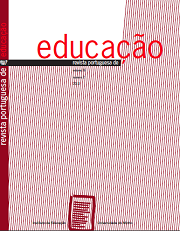Políticas de descentralização da educação no Brasil e em Portugal: avanços e recuos da desconcentração de poderes
DOI:
https://doi.org/10.21814/rpe.3244Resumen
Este artigo visa estabelecer paralelos comparativos em torno da
descentralização da educação no Brasil e em Portugal, a partir da década de 1990, com base na revisão da literatura pertinente e dos marcos jurídicos que vieram regulá-la, procurando problematizar as relações institucionais e sociopolíticas que medeiam este processo, no Brasil, sob a ótica do regime de colaboração e, em Portugal, segundo as relações estabelecidas entre os poderes central e local. Como conclusão mais geral, constata que, apesar de o poder central vir difundindo o discurso da descentralização nestes países, já há algum tempo, tudo leva a crer que o plano da retórica não logrou ser efetivamente superado, pois entre avanços e recuos deste processo as tentativas vêm se constituindo em movimentos de alguma desconcentração de poderes, ainda marcados pela mesma lógica centralizadora, herança históricosocial, em ambos os casos, dos seus respectivos períodos ditatoriais, agora também sob a modulação de políticas econômicas neoliberalizantes.
Palavras-chave
Descentralização da educação; Municipalização da educação; Relações interinstitucionais; Educação comparada Brasil-Portugal
Descargas
Descargas
Publicado
Cómo citar
Número
Sección
Licencia
1. Los autores y autoras conservan los derechos de autor y conceden a la revista el derecho de la primera publicación, con el trabajo simultáneamente disponible bajo la Licencia Creative Commons Attribution que permite compartir el trabajo con el reconocimiento de la autoría y publicación inicial en esta revista.
2. Los autores y autoras pueden asumir contratos adicionales separadamente para la distribución no exclusiva de la versión del trabajo publicada en esta revista (por ejemplo, depositar en un repositorio institucional o como capítulo de libro), con el reconocimiento de la autoría y publicación inicial en esta revista.
3. Los autores y autoras están autorizados y son incitados/as a publicar y compartir su trabajo en línea (por ejemplo, en repositorios institucionales o páginas personales) antes o durante el proceso editorial, pues puede dar lugar a modificaciones productivas o aumentar el impacto y las citas del trabajo publicado (Véase El Efecto del Acceso Libre).
Esta obra está disponible bajo la Licencia Creative Commons Atribución-CompartirIgual 4.0.




















